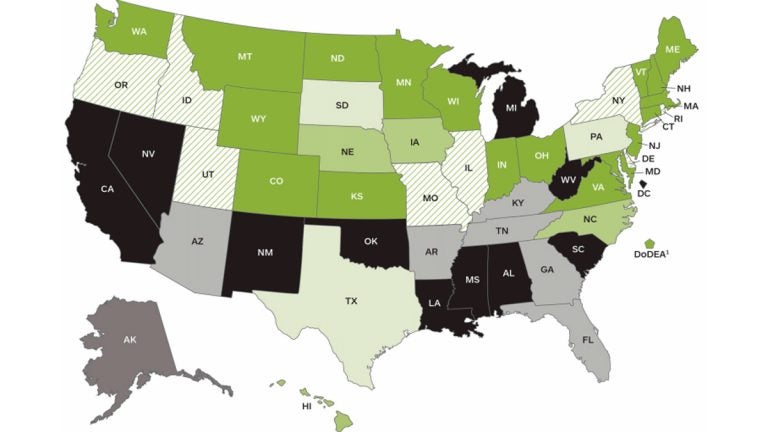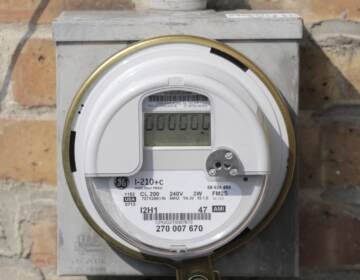Are New Jersey’s latest national test scores good news or bad news?

New Jersey (highlighted in green) shows scores higher than the national average at both grades 4 and 8
Last week the National Assessment of Educational Progress (NAEP) released results of 2013 state tests. While many other standardized tests get no respect, the NAEP assessments, also called “The Nation’s Report Card,” are highly regarded by educators, offering an accurate profile of state progress in reading, math, and science for public school students, including those enrolled in charter schools. You can’t cheat on NAEP tests. They’re weighted properly for socio-economics, disabilities, and English Language Learners. The country’s harshest test critics, including doyenne Diane Ravitch, refers to NAEP as the “gold standard” of standardized testing.
New Jersey’s scores were flat, one statistically insignificant point lower than last year’s NAEP results. Forty-nine percent of 8th graders were proficient in math and 47 percent were proficient in reading. Our achievement gaps, historically larger than most states, were static, about 20 points between white and Hispanic children and 25 points between white and black children.
Diane Ravitch herself commented in the Huffington Post, “New Jersey…actually lost ground.”
The national press was unimpressed. The Wall Street Journal remarked on the “sluggish progress nationwide,” Education Week said that “the numbers still painted a less-than-rosy picture of American academic strength,” and the New York Times noted that “American fourth and eighth graders showed incremental gains in reading and math this year, but achievement gaps between whites and blacks, whites and Hispanics, and low-income and more affluent students stubbornly persist”
But here’s the big national news: the two states that have historically performed at the back of the pack, Tennessee and Washington, D.C., had the biggest gains, four times higher than any other state, and both narrowed their achievement gaps. Notably these are the two states that are furthest ahead in implementing education reform tenets like data-driven teacher evaluations, higher curricular standards, and expansion of school choice.
Enter the spin doctors.
First is Education Commissioner Chris Cerf, an ardent education reform advocate. In a statement he said, “while we celebrate the success of so many of our schools and we work to free them of unnecessary state regulations and bureaucracy we must also continue to strengthen our schools that are struggling, so all students in all corners of New Jersey can receive a world-class education.”
Next to enter the spin room is David Sciarra, Executive Director of the Education Law Center, a foe of Cerf, and committed to traditional educational strategies. In a press release Sciarra proffered our scores as proof that “NJ’s public education system is among the highest performing in the nation.” He added, “I hope these results will end the false narrative of public school failure too often heard from politicians who should know better.”
We’d expect a big show from NJEA. Historically, NAEP scores are an occasion for the teachers’ union to celebrate the sustainability of NJ’s traditional school system, a validation of everything we do right. NJEA’s website features older NAEP news: “our writing scores are the best in the nation: New Jersey eighth graders rank #1—far above any other state in the nation—in writing in the National Assessment of Educational Progress (NAEP).” NJ’s “math scores are among the best in the nation: New Jersey ranks third in the nation for having the largest proportion of public school eighth graders scoring at the highest two levels in math in the National Assessment of Educational Progress (NAEP) and fifth in the nation among fourth graders.”
When the 2010 scores were released, then-NJEA President Barbara Keshishian held a press conference to say, “What the governor isn’t telling the public is that New Jersey is a national leader in closing the achievement gap. That obviously doesn’t serve his agenda.”
It’s a smart strategy. By highlighting strong student achievement in NAEP testing, NJEA signals its disapprobation of education reform tenets like rigorous standards and testing, expansion of charter schools, and tenure reform.
But this year? Silence. Which is also smart.
Data is like cotton candy, infinitely spinnable. Even the best data, like NAEP’s, is subject to manipulation, so let’s all take a deep breath. The results in Tennessee and D.C. are very encouraging, indicative that school choice, high standards, and heightened accountability are good for kids. But lobbyists should forestall any pronouncements until we see multi-year trends.
N.J.’s results are sobering. But we’ve just embarked on a series of initiatives, if the Tennessee and D.C. results hold out, bode well for the future. We’ve adopted the Common Core State Standards, which raise our collective curricular bar. We’re implementing more granular teacher evaluations. We’re trying to expand school choice. If the numbers tell us anything, it’s that we’re on the right track.
__________________________________________________
Laura Waters is president of the Lawrence Township School Board in Mercer County. She also writes about New Jersey’s public education on her blog NJ Left Behind. Follow her on Twitter @NJLeftbehind.
WHYY is your source for fact-based, in-depth journalism and information. As a nonprofit organization, we rely on financial support from readers like you. Please give today.





